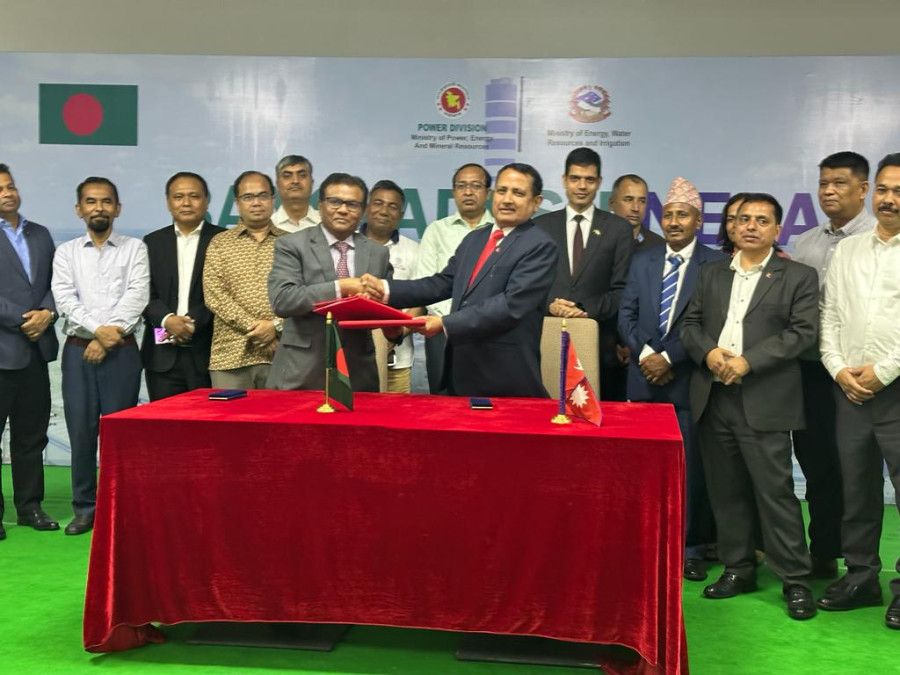National
Nepal, Bangladesh agree to pursue India deal to start power trade from this wet season
If Nepal succeeds in selling electricity to Bangladesh, it will be the country’s first power export outside India.
Prithvi Man Shrestha
Nepal and Bangladesh have agreed to make efforts to start trading of power from the upcoming wet season (June-November) with the export of 40–50MW electricity from Nepal, according to a member of the Nepali delegation to the bilateral talks held in Patuakhali, Bangladesh.
During the fifth meeting of the secretary-level Joint Steering Committee on energy cooperation between Nepal and Bangladesh on Tuesday, the two sides agreed to start trading of power by taking India, which lies between the two countries, on board.
A meeting of the joint-secretary level Joint Working Group, held on Monday at the same venue, had made its recommendations to the Joint Steering Committee.
The Nepal Electricity Authority, the Bangladesh Power Development Board and the NTPC Vidyut Vyapar Nigam Limited (NVVN) of India will finalise a tripartite agreement shortly, Prabal Adhikari, power trade director at the NEA, told the Post from Bangladesh.
If Nepal succeeds in selling electricity to Bangladesh, it will be the country’s first power export outside India.
During the fourth Joint Working Group and Joint Steering Committee meeting held in August last year, the two countries had decided to request India to allow the export of 40–50 MW electricity from Nepal to Bangladesh in the initial phase by utilising the high-voltage Baharampur-Bheramara cross-border transmission link.
As per last year’s understanding, the Nepal Electricity Authority and the Bangladesh Power Development Board would request India’s NVVN for a trilateral agreement to sell Nepal’s power to Bangladesh using the power line.
In line with the agreement reached with Bangladesh, the NEA has sent a request to the Indian authorities through the NVVN, a nodal agency of India, for bilateral electricity trade with its neighbours.
During the 10th joint secretary-level Joint Working Group and the secretary-level Joint Steering Committee meetings between Nepal and India held in February this year, India agreed to grant its approval once Nepal submits the proposal specifying the project whose power will be sold to Bangladesh, according to Nepal’s energy ministry.
Based on an understanding between Nepal and India, the NEA has sent a request to the Indian authorities, asking them to allow the sale of the power generated by the 52.4MW Likhu-4 project to Bangladesh through India’s existing transmission infrastructure.
According to a report in Dhaka Tribune, the two sides discussed the import of electricity from Nepal to Bangladesh by using existing interconnection grid lines over India and construction of new transmission lines.
The meeting agreed that issues related to the new transmission line to be constructed exclusively within the territory of India will be decided through the Bangladesh-India-Nepal tripartite agreement, according to the report.
The steering committee meeting discussed in detail the construction of hydropower plants in Nepal with Nepal-Bangladesh joint investment. Adhikari said that the 683 MW Sunkoshi 3 hydropower project would be developed under the joint venture arrangement between the two sides.
“The two countries agreed that Nepal’s state-owned Nepal Electricity Authority and Bangladesh Power Development Board would sign the joint venture agreement within the next six months to develop this project,” said Adhikari, a member of Nepali delegation.
Even though the two sides earlier agreed to develop this project under joint venture arrangement, there was no clarity on the entities from both the countries to be involved in developing the project.
There has been some progress in studies for the development of this project. Both feasibility study and environment impact assessment (EIA) of the project have been completed and these reports were sent to the Bangladeshi side earlier, according to Nepali officials.
During the fourth meeting of these bilateral mechanisms held in Nepal, the sides had agreed that Nepal would provide the environment impact assessment report to the Bangladeshi side and later would respond with its opinion. The two sides had also agreed to take ahead the process of establishing a joint venture to develop the project.
After getting a nod from the Ministry of Forest and Environment to the EIA report late last year, Nepal’s energy ministry had shared the document with the Bangladeshi side.
During the latest meeting, the sides also agreed to facilitate the power sale agreement between GMR Upper Karnali Hydropower and the Bangladeshi side to sell 500MW of electricity to be produced by 900MW Upper Karnali Hydropower Project in western Nepal.
“The two sides reached an understanding to facilitate power sale agreement as early as possible,” Madhu Bhetuwal, spokesperson at the NEA, told the Post.
In a great relief to the Indian company GMR, the Constitutional Bench of the Supreme Court on May 7 had vacated an interim order of the same court that had barred the Indian company from working towards financial closure of the project.
The Constitutional Bench had scrapped half-a-dozen writ petitions that had challenged a government decision to give the Indian developer more time to conclude the project’s financial closure. (Financial closure entails ensuring enough resources to implement the project.)
After the court verdict, KK Sharma, head of the GMR Upper Karnali Hydropower Company, told the Post that his company would expedite the signing of the tripartite agreement with Bangladesh Power Development Board and NTPC Vidyut Vyapar Nigam Limited (NVVN) of India.
The NVVN is the Indian nodal agency designated by the Indian government for trading power with bordering countries. “This will be one of the milestones for our company,” Sharma told the Post on Tuesday.




 8.22°C Kathmandu
8.22°C Kathmandu














